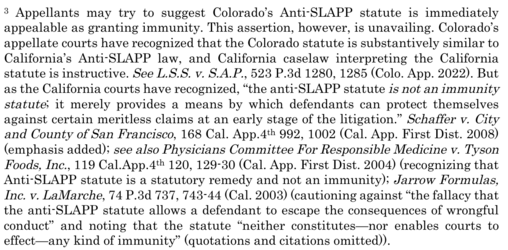Problem for Montagraph rests that California (and the 9th circuit) has recognized that denial of an anti-slap motion is immediately appealable under the collateral order doctrine. Nick indeed points that out. See:
That's only half correct. It's correct with respect to the Ninth Circuit.
In California state court (and in other states with similar statues, like Colorado) the reason it is immediately appealable is because the statute explicitly says it should be when laying out the anti-SLAPP procedure. And Monty presents lots of quotes from California case law that contradicts Rekieta's claims that the anti-SLAPP constitutes an immunity statute.

I think the point that I found most significant was that apparently the collateral-order doctrine's 2nd requirement, that the order "resolves an important issue completely separate from the merits of the action" (which seemed questionable to me), has been considered by courts which determined that denial of the anti-SLAPP motion does resolve an issue that is separate from the merits of the action, because denial of the motion is not an indication that the case has merit.
In terms of whether denials of anti-SLAPP motions are subject to interlocutory appeals, well, in the Ninth Circuit, sure. But Montagraph's memorandum cited the Tenth Circuit coming to a different conclusion; the Second Circuit's take on the 9th Circuit decision Rekieta cites is "We disagree"... and that's beside the point that it's easy to find that in many circuits state anti-SLAPPs are not applied at all, though for reasons that aren't relevant in this case.
The upshot of all this is that the Minnesota judiciary has been shown to have an exceptionally dim view of anti-SLAPP statutes in general, so I think it's an large stretch to expect them to contort into the position of "the issue of an immunity from the burden of dealing with meritless lawsuits can be resolved separately from the merits of a lawsuit".
I think there's a much stronger argument that the choice-of-law analysis itself could be separated from the merits of the suit so as to determine whether the anti-SLAPP from Colorado should apply
at all, and if the answer was "Yes", to remand it to Fischer to make a determination. I have previously said this would be the most hilarious option if the result of that was for the anti-SLAPP to be applied but Rekieta's motion denied anyway.
But even then there's issues with that, as Monty's brief points out.
It's not like there's been anything in the meantime that would've suddenly make Nick want to take a stand. The only recent development I'm aware of is Veritas declaring formal bankruptcy last week.
Check the Rekieta thread.
O'Keefe recorded a video about being served with a lawsuit by Veritas and dedicated a surprisingly long portion of the video to calling out Randazza Legal Group in particular. This has resulted in Rekieta getting more heat about his choice of lawyer.




